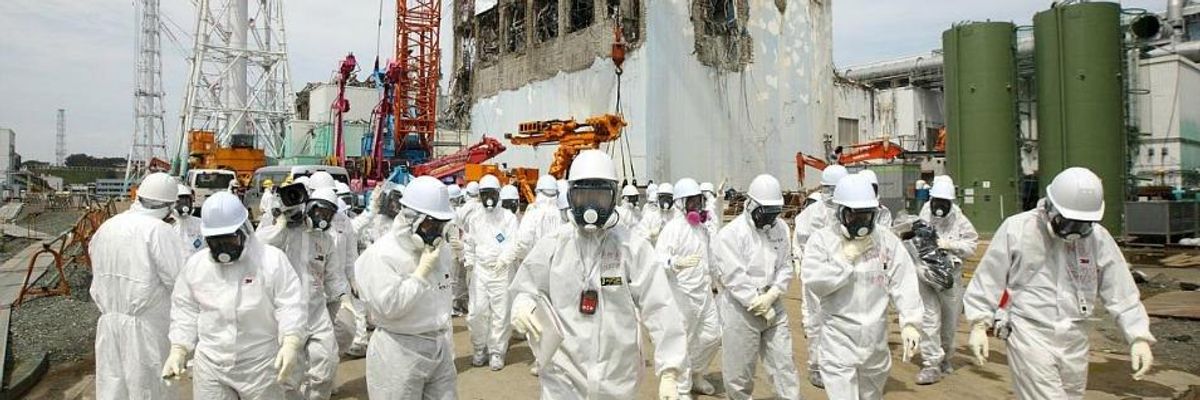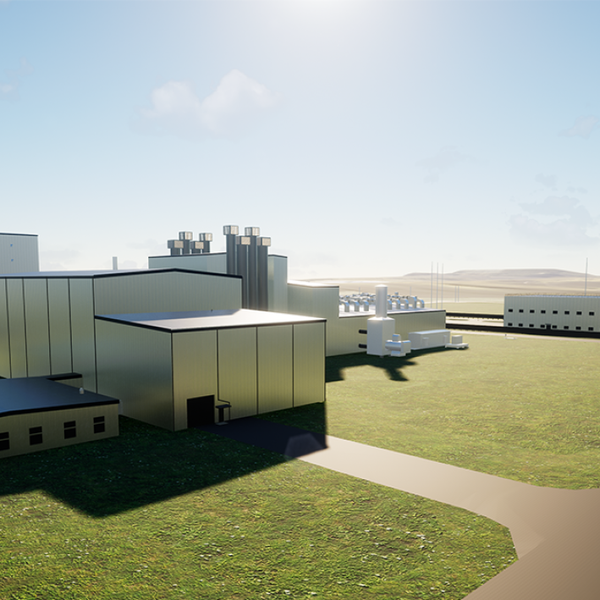
Members of the media and TEPCO employees walk in front of the No. 4 reactor building, crippled by the March 11, 2011 earthquake and tsunami, at the utility company's Fukushima Dai-ichi nuclear power plant in Okuma, Fukushima prefecture, Japan, May 26, 2012. (Photo: Tomohiro Ohsumi, Pool)
Japanese Prosecutors Demand 5 Years in Prison for Executives Facing Trial for Fukushima Nuclear Disaster
"It was easy to safeguard the plant against tsunami, but they kept operating the plant heedlessly."
More than seven years after the Fukushima nuclear disaster, prosecutors in Japan on Wednesday demanded that three former executives from Tokyo Electric Power Co. (TEPCO) each face five years behind bars for failing to ensure the safety of the power plant.
"It was easy to safeguard the plant against tsunami, but they kept operating the plant heedlessly. That led to the deaths of many people."
--prosecutors
In March of 2011, the most powerful earthquake to ever strike Japan triggered a tsunami that caused three reactors at the Fukushima Dai-ichi nuclear complex to melt down, forcing hundreds of thousands of nearby residents to evacuate. In court on Wednesday, the prosecution accused TEPCO's leadership of "postponing" safety measures designed to protect the plant from powerful tsunamis.
"It was easy to safeguard the plant against tsunami, but they kept operating the plant heedlessly," prosecutors said at the trial at the Tokyo District Court, according to The Asahi Shimbum, a Japanese newspaper. "That led to the deaths of many people."
While the prosecution claims at least 44 people died in connection with the incident, other estimates have put the number around 1,600. Prosecutors called for the five-year sentences, the maximum punishment allowed for the charges, during closing arguments on Wednesday.
The three executives standing trial for negligence resulting in death and injury are former TEPCO chairman Tsunehisa Katsumata, 78, as well as former vice presidents Sakae Muto, 68, and Ichiro Takekuro, 72. They all pleaded not guilty.
"The case has taken a twisting journey to arrive at this point," NPR noted. "In two instances, public prosecutors opted not to seek indictments against the three TEPCO executives."
A panel of randomly selected citizens, however, disagreed, which led to the ongoing trial. As Japan's NHK News reported:
In line with that decision, the men were indicted by court-appointed lawyers in February 2016.
The court-appointed lawyers say the defendants were told two to three years before the accident that a massive tsunami could hit the nuclear plant. They also say the defendants did not try to gather information about the potential danger. The court-appointed lawyers indicate that the former executives later claimed that they had not been informed, and that the executives put all the blame on their subordinates.
The court-appointed lawyers also say the defendants should have suspended the plant's operations when they were told that a massive tsunami could hit the plant.
An attorney for victims' families was slated to speak on Thursday, but defense lawyers aren't scheduled to deliver their closing arguments until March of 2019.
The executives' trial follows a class-action suit decided late last year, when a federal court ordered TEPCO and the Japanese government to pay a total of 500 million yen ($4.4 million USD) to thousands of plaintiffs--who received, at most, a few thousand U.S. dollars each. Meanwhile, in the region around the nuclear facility, public health concerns persist.
An Urgent Message From Our Co-Founder
Dear Common Dreams reader, The U.S. is on a fast track to authoritarianism like nothing I've ever seen. Meanwhile, corporate news outlets are utterly capitulating to Trump, twisting their coverage to avoid drawing his ire while lining up to stuff cash in his pockets. That's why I believe that Common Dreams is doing the best and most consequential reporting that we've ever done. Our small but mighty team is a progressive reporting powerhouse, covering the news every day that the corporate media never will. Our mission has always been simple: To inform. To inspire. And to ignite change for the common good. Now here's the key piece that I want all our readers to understand: None of this would be possible without your financial support. That's not just some fundraising cliche. It's the absolute and literal truth. We don't accept corporate advertising and never will. We don't have a paywall because we don't think people should be blocked from critical news based on their ability to pay. Everything we do is funded by the donations of readers like you. Will you donate now to help power the nonprofit, independent reporting of Common Dreams? Thank you for being a vital member of our community. Together, we can keep independent journalism alive when it’s needed most. - Craig Brown, Co-founder |
More than seven years after the Fukushima nuclear disaster, prosecutors in Japan on Wednesday demanded that three former executives from Tokyo Electric Power Co. (TEPCO) each face five years behind bars for failing to ensure the safety of the power plant.
"It was easy to safeguard the plant against tsunami, but they kept operating the plant heedlessly. That led to the deaths of many people."
--prosecutors
In March of 2011, the most powerful earthquake to ever strike Japan triggered a tsunami that caused three reactors at the Fukushima Dai-ichi nuclear complex to melt down, forcing hundreds of thousands of nearby residents to evacuate. In court on Wednesday, the prosecution accused TEPCO's leadership of "postponing" safety measures designed to protect the plant from powerful tsunamis.
"It was easy to safeguard the plant against tsunami, but they kept operating the plant heedlessly," prosecutors said at the trial at the Tokyo District Court, according to The Asahi Shimbum, a Japanese newspaper. "That led to the deaths of many people."
While the prosecution claims at least 44 people died in connection with the incident, other estimates have put the number around 1,600. Prosecutors called for the five-year sentences, the maximum punishment allowed for the charges, during closing arguments on Wednesday.
The three executives standing trial for negligence resulting in death and injury are former TEPCO chairman Tsunehisa Katsumata, 78, as well as former vice presidents Sakae Muto, 68, and Ichiro Takekuro, 72. They all pleaded not guilty.
"The case has taken a twisting journey to arrive at this point," NPR noted. "In two instances, public prosecutors opted not to seek indictments against the three TEPCO executives."
A panel of randomly selected citizens, however, disagreed, which led to the ongoing trial. As Japan's NHK News reported:
In line with that decision, the men were indicted by court-appointed lawyers in February 2016.
The court-appointed lawyers say the defendants were told two to three years before the accident that a massive tsunami could hit the nuclear plant. They also say the defendants did not try to gather information about the potential danger. The court-appointed lawyers indicate that the former executives later claimed that they had not been informed, and that the executives put all the blame on their subordinates.
The court-appointed lawyers also say the defendants should have suspended the plant's operations when they were told that a massive tsunami could hit the plant.
An attorney for victims' families was slated to speak on Thursday, but defense lawyers aren't scheduled to deliver their closing arguments until March of 2019.
The executives' trial follows a class-action suit decided late last year, when a federal court ordered TEPCO and the Japanese government to pay a total of 500 million yen ($4.4 million USD) to thousands of plaintiffs--who received, at most, a few thousand U.S. dollars each. Meanwhile, in the region around the nuclear facility, public health concerns persist.
More than seven years after the Fukushima nuclear disaster, prosecutors in Japan on Wednesday demanded that three former executives from Tokyo Electric Power Co. (TEPCO) each face five years behind bars for failing to ensure the safety of the power plant.
"It was easy to safeguard the plant against tsunami, but they kept operating the plant heedlessly. That led to the deaths of many people."
--prosecutors
In March of 2011, the most powerful earthquake to ever strike Japan triggered a tsunami that caused three reactors at the Fukushima Dai-ichi nuclear complex to melt down, forcing hundreds of thousands of nearby residents to evacuate. In court on Wednesday, the prosecution accused TEPCO's leadership of "postponing" safety measures designed to protect the plant from powerful tsunamis.
"It was easy to safeguard the plant against tsunami, but they kept operating the plant heedlessly," prosecutors said at the trial at the Tokyo District Court, according to The Asahi Shimbum, a Japanese newspaper. "That led to the deaths of many people."
While the prosecution claims at least 44 people died in connection with the incident, other estimates have put the number around 1,600. Prosecutors called for the five-year sentences, the maximum punishment allowed for the charges, during closing arguments on Wednesday.
The three executives standing trial for negligence resulting in death and injury are former TEPCO chairman Tsunehisa Katsumata, 78, as well as former vice presidents Sakae Muto, 68, and Ichiro Takekuro, 72. They all pleaded not guilty.
"The case has taken a twisting journey to arrive at this point," NPR noted. "In two instances, public prosecutors opted not to seek indictments against the three TEPCO executives."
A panel of randomly selected citizens, however, disagreed, which led to the ongoing trial. As Japan's NHK News reported:
In line with that decision, the men were indicted by court-appointed lawyers in February 2016.
The court-appointed lawyers say the defendants were told two to three years before the accident that a massive tsunami could hit the nuclear plant. They also say the defendants did not try to gather information about the potential danger. The court-appointed lawyers indicate that the former executives later claimed that they had not been informed, and that the executives put all the blame on their subordinates.
The court-appointed lawyers also say the defendants should have suspended the plant's operations when they were told that a massive tsunami could hit the plant.
An attorney for victims' families was slated to speak on Thursday, but defense lawyers aren't scheduled to deliver their closing arguments until March of 2019.
The executives' trial follows a class-action suit decided late last year, when a federal court ordered TEPCO and the Japanese government to pay a total of 500 million yen ($4.4 million USD) to thousands of plaintiffs--who received, at most, a few thousand U.S. dollars each. Meanwhile, in the region around the nuclear facility, public health concerns persist.

